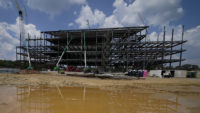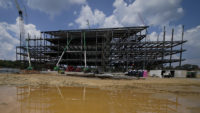The City of Rock Hill, S.C., has filed an adversarial lawsuit to recover $20 million plus damages from developers of the now-canceled Carolina Panthers $800-million headquarters and practice facility.
The Sept. 7 filing in federal court in Delaware is part of ongoing bankruptcy proceedings for GT Real Estate Holdings, LLC, created by Panthers owner David Tepper to manage the 234-acre mixed-use project in Rock Hill.
The city, which had agreed in 2019 to issue $225 million in bonds to fund infrastructure improvements at the site, accuses GTRE of intentionally breaching its contractual obligations, claiming the company “failed to timely provide the necessary documents and information as to the development of the Project, failed to sign and deliver the documents necessary for the issuance of tax-exempt bonds and twice prevented the City from proceeding to an initial bond closing.”
In January 2022, 18 months after the Mascaro Construction/Barton Mallow CM-at-risk joint venture broke ground on the project, the lawsuit contends, GTRE told the city to cancel the bond sale, and that the project would be scaled back to include only the centerpiece five-story, 600,000-sq-ft indoor practice facility.
GTRE halted construction in March, saying at the time that “our partners have been unable to contribute the agreed-upon investment to fund the construction of the public infrastructure.”
Although Rock Hill offered to help find ways to keep the project alive, including a $135-million bond offering, the Panthers ultimately pulled the plug in mid-April. GTRE filed for bankruptcy protection less than two months later.
“GTRE’s conduct in breaching the contract is characterized by dishonesty in fact, unfair dealing, or the unlawful appropriation of the City’s property,” the filing says. “GTRE is liable to the City for breach of contract accompanied by fraud.” The filing also requests a jury trial to settle the matter.
In a separate filing to the bankruptcy court, GTRE attorneys responded that Rock Hill’s lawsuit is based on “false and incendiary claims,” and that the company had invested $240 million in the project. It was only after the city failed to meet its obligations under “unambiguous” and “good faith” agreements with GTRE, the filing claims, that the project had to be canceled.
The amount sought by Rock Hill’s lawsuit is similar to the minimum amount it would receive from net proceeds of the property’s sale, under GTRE’s proposed restructuring plan filed in August. The plan, which has not been approved by the court, also provides nearly $61 million to settle claims from Mascaro/Barton Mallow and other contractors involved with the project.




